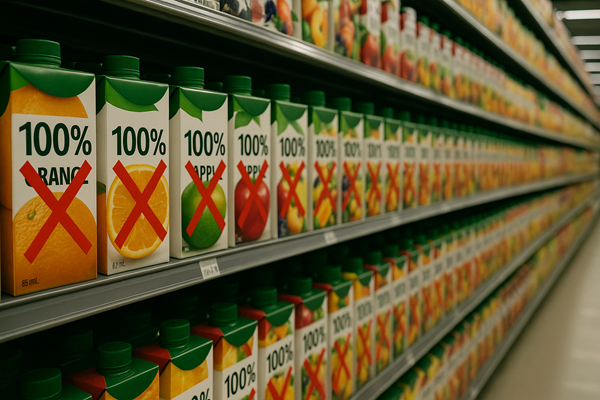.png)

Krishnadevan is Editorial Director at BasisPoint Insight. He has worked in the equity markets, and been a journalist at ET, AFX News, Reuters TV and Cogencis.
June 4, 2025 at 10:06 AM IST
I, like many of us, have paid a premium for a food product that flaunted "100%" on the label—trust, after all, comes at a price.
Well, those brands may have just lost our business.
On May 28, the Food Safety and Standards Authority of India issued a directive banning "100%" claims on food packaging and advertisements—unless they are clear, truthful, and fully justifiable.
On the surface, it's a label tweak. In reality, it cuts deep into the marketing muscle of India's premium food brands.
This latest directive follows an earlier warning to juice makers using the “100% juice” tag for reconstituted concentrates. Now, the crackdown extends to organic groceries, cold-pressed oils, and "natural" snacks as well.
For brands that have built their identity and pricing power on the "100%" badge, the FSSAI's action signals an identity crisis. It's less a case of fraud, more a masterclass in marketing ambiguity. It was legal, but misleading.
A juice made from concentrate with added vitamins and sugar might technically comply with food safety standards. But calling it "100% juice" when consumers expect pure fruit? That’s a semantic sleight of hand. The same goes for "100% natural" claims on everything from teas to snacks, often without sufficient disclosure.
The 100% tag has acted as a pricing cheat code, allowing markups of 30–60% in crowded grocery aisles. Both upstart and legacy brands have leaned on the claim to signal purity and command higher margins.
If brands are forced to drop the 100% claim, they risk losing the halo that supports premium pricing. Dropping "100%" could dent margins, if not sales—especially for listed firms riding the "natural" wave.
Ironically, brands that never relied on the "100%" claim may now find their focus on ingredient transparency, traceability, and plain-speak honesty turning into a competitive edge. As consumers grow savvier and regulators more vigilant, trust will be built not on adjectives but on evidence.
For brands, this is a wake-up call to move beyond clever labelling and invest in genuine transparency, certifications, and clear ingredient lists. Those who have already built trust through authentic practices are likely to weather the storm better than those who relied on marketing spin. Proactively auditing product portfolios, updating claims, and investing in third-party certifications or technology-driven traceability will become essential.
Rebranding Rush
ITC has already reworked the messaging on its 'B Natural' fruit juices, but its ‘Right Shift' range of "nutrient-dense" food products aimed at those over 40 years old could face the heat.
Dabur has backpedalled too—swapping "100% fruit juice" for "100% no added sugar and preservatives." Nutritionists aren’t impressed. It’s semantics with a sugar-free sheen. The company has also challenged the FSSAI's directive in the Delhi High Court.
Analysts say more pressure is coming for the likes of Marico, Tata Consumer Products, including its recently acquired 24 Mantra Organic, Hindustan Unilever, Nestle and Direct-to-Consumer brands like Epigamia, Paper Boat, Slurrp Farm, The Nestery, and Timios. For them, the regulatory mood has turned; and so has consumer scrutiny.
India's move is part of a global rise in labelling rigour and transparency. The US FDA is cracking down on vague "natural" claims, and the European Union is experimenting with front-of-pack eco-scores.
Indian consumers now have a new reference guide. Reading beyond the label will become the norm, empowering buyers to nudge brands toward higher standards of honesty and integrity.
But this isn't a one-and-done move. Real change will depend on how firmly regulators stand, how quickly companies adapt, and how loudly consumers demand what was always theirs: the truth on the label.




